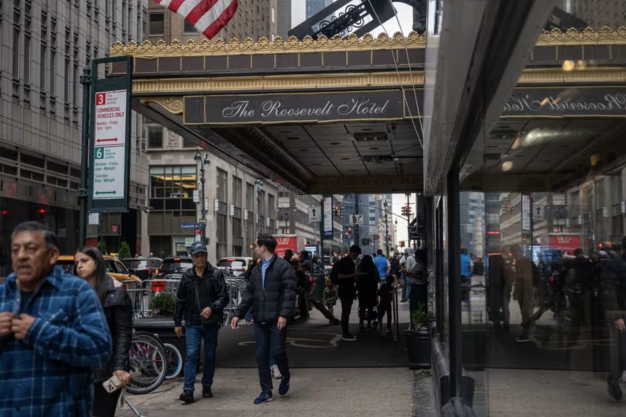
As shelter limit for migrant families nears, NYC schools try to prepare
New York City schools have started preparing for a massive reshuffling of students as early as next month, as thousands of migrant families face a new limit on shelter stays, say education officials.
Approximately 2,700 families have received notices since 27 October that they’ll either have to reapply for shelter or find alternative housing within 60 days, according to a City Hall spokesperson. That means families will have to leave their shelters as early as 27 December. For families who do reapply for shelter, there’s no guarantee they’ll end up in the same site, or even the same borough.
Mayor Eric Adams has argued that the limits are necessary to relieve severe overcrowding in the city’s shelter amid an unprecedented and ongoing influx of migrants, many of whom are seeking asylum. Case workers will help families figure out next steps, according to city officials.
But educators and advocates have sounded the alarm for months that the policy could have devastating educational consequences, says Michael Elsen-Rooney of Chalkbeat New York.
Preparations are underway to try to minimize the disruptions and inform families of their rights, especially in Manhattan where the shelters are concentrated, Education Department officials said on Wednesday.
“What we’ve started to do is look very closely at where those students are located, engage principals, engage superintendents,” said Flavia Puello-Perdomo, an Education Department official who oversees students in temporary housing. “While we can’t fully control all the implications of the 60-day rules … as much as possible we’ll ensure every family is aware they have the right to stay in their schools.”
Federal law requires school districts to provide transportation for homeless students so they can remain in their schools. The city Education Department offers school buses for homeless students in kindergarten to sixth grade, and MetroCards for older kids. But arranging that transportation can take a long time, and the city’s sprawling school bus system is notoriously unreliable, according to advocates and educators.
Many families may opt to transfer rather than enduring that uncertainty and a potentially grueling commute.
One Manhattan school is getting ready to call all of its migrant families to ask if they’ve received the notices and walk them through their options, according to the principal, who spoke on the condition of anonymity.
But the principal said no amount of preparation will prevent the massive disruptions ahead.
“It’s going to be like musical shelters,” the principal said. “All these kids who we’ve spent the last 10 months building relationships with … we’re going to break that bond.”
Schools brace for logistical challenges
During Wednesday’s council hearing on immigrant students, Education Department officials offered a glimpse at the huge logistical challenges schools and families are facing as the 60-day deadlines hit.
The first task will be figuring out which families have even received the notices and where they are headed.
Staffers who work with the newly-arrived families said it’s possible some will leave the city or find their own apartments, but others will have no option other than reapplying for shelter.
“I’ve visited the shelter near me,” said the Manhattan principal. “My assumption is that if they had a better option, they would’ve already used it.”
The Education Department doesn’t have a data-sharing agreement with Health + Hospitals, the agency that administers many of the newly-created Humanitarian Emergency Response and Relief Centers, or HERRCs, where migrants are residing. That means schools won’t get automatic updates when children transfer from one shelter to another, officials said.
It could fall largely to schools to track down families to figure out if they’ve received a 60-day notice, where they’re moving, and whether they’ll need transportation – an especially daunting challenge given many of the newly-arrived families still may not have reliable phones.
The Education Department employs roughly 100 community coordinators who work directly with families in shelters – but that’s far short of the more than 360 shelters now operating across the city, according to an Education Department official. Delays in figuring out where families have transferred will lead to delays in arranging transportation or finding new school placements.
Families face long commutes, school transfers
Even if the communication between schools and families is seamless, families who have to leave their shelters will face the tough decision of enduring a longer commute or transferring schools.
The Manhattan principal said several families have already switched shelters, and opted to remain at the school – but their attendance has suffered.
Schools across the city are already struggling with elevated rates of chronic absenteeism and the problem is even more severe for students in shelters, over 70% of whom were chronically absent last school year. The reshuffling from the 60-day notices will likely make that worse, the principal argued.
Transportation is especially challenging from the newly-opened shelter at Floyd Bennett, a former airfield in southern Brooklyn. The emergency shelter, which officials say can accommodate 500 families, has drawn fierce criticism from advocates who say it’s inappropriate for children, and some families have refused to stay there.
Education Department officials said on Monday that roughly 195 children staying at the shelter have registered for school. But Glenn Risbrook, the Education Department’s senior executive director for student transportation, acknowledged it’s in a “transportation desert” and said the agency has arranged for a coach bus to connect families to public transportation so they can get to school.
Michael Elsen-Rooney is a reporter for Chalkbeat New York, covering NYC public schools.
This story was originally published by Chalkbeat.




